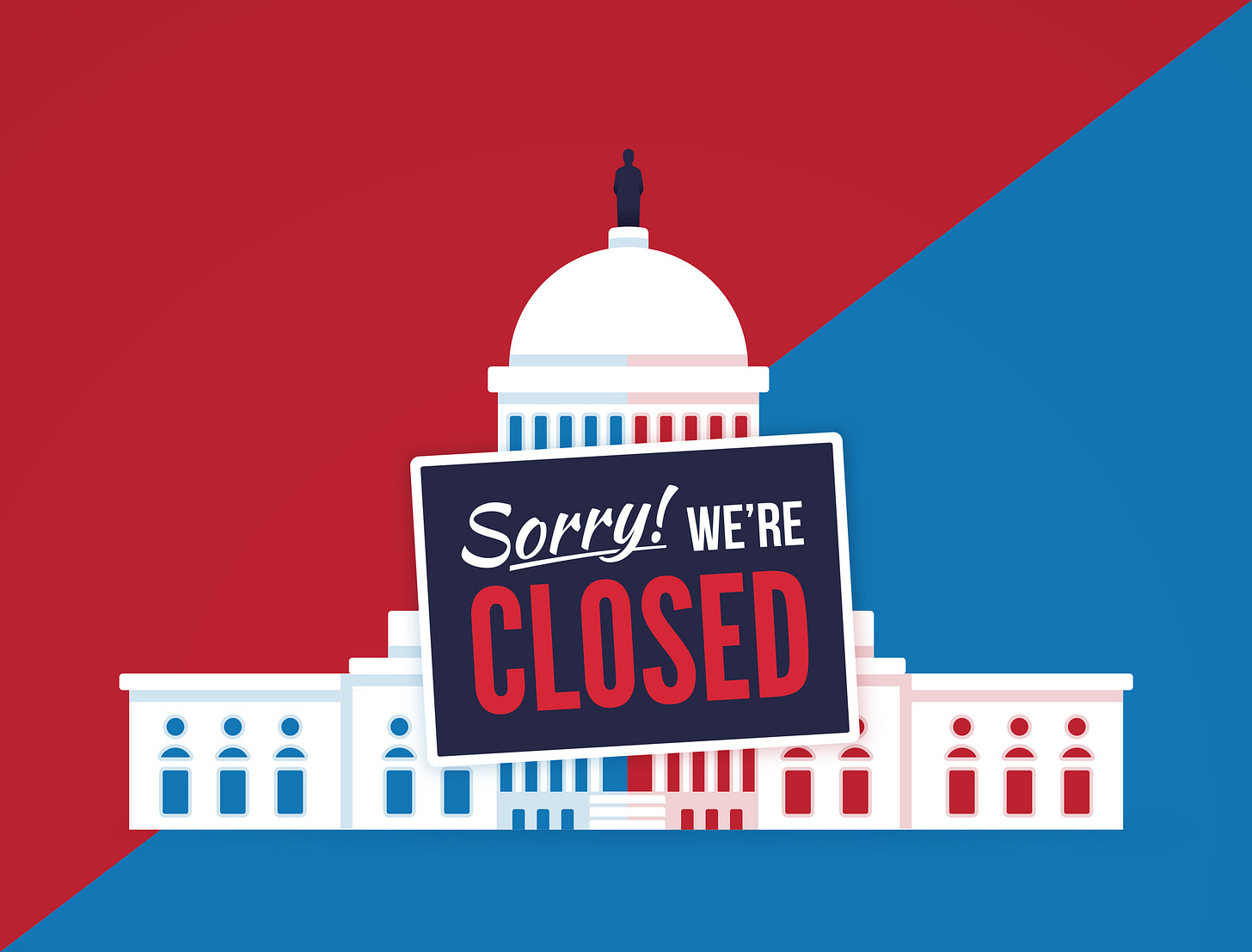Costly Government Shutdown
A US government shutdown has a real cost to the government, the economy, and millions of Americans.
In just seven days, the federal government could be shut down due to a failure to pass a budget. While it is easy to blame both sides of the aisle and all of Congress, far-right Republicans are not only holding out for extreme policy goals; they are actively pushing for a shutdown.
MAGA politicians see the economy and the American people as pawns in their quest for power. Just as with the debt ceiling debates, they don’t care how many people are hurt if it means they can get a win.
Their new spin is the claim that a shutdown will only affect non-essential government aspects.
800,000 Americans, and history exposes this claim as the lie it is.
US Government shutdowns did not occur before the 1980s. A new appropriations process established in the late 1970s, combined with a new interpretation of the 1884 Antideficiency Act, brought about the era of government shutdowns.
These types of shutdowns are unheard of in other countries, the same way that other nations do not have debt ceiling negotiations and shutdowns.
Despite bipartisan efforts over the years to get rid of these flawed approaches to government, there are always holdouts. This is because these situations allow minority parties, or even minority extremist groups within a party, leverage to force their positions onto the majority.
Before 1995, shutdowns occurred from mixed control of Congress, including times when Democrats controlled the House. These were shutdowns of less than a day, sometimes as short as 4 hours, and were more due to the new strict interpretation of the Antideficiency Act, which mandated a shutdown if an agreement wasn’t solidified in time.
Since then, government shutdowns have become a go-to tactic for Republicans to force through unpopular cuts and legislation.
From 1995 to the present, all government shutdowns occurred when Republicans controlled the House, and in all but one of the five shutdowns, Republicans also held control of the Senate. These shutdowns were much longer than in the past, including a 21-day shutdown in 1995-96, a 16-day shutdown in 2013, and a 35-day shutdown in 2018-19.
For Republicans to suggest that a shutdown will save the government money or that the shutdown will only affect nonessential operations is a full-fledged lie to attempt to keep the support of their base while actively working against their constituents.
Thanks to a 2019 law, the Government Employee Fair Treatment Act, federal employees are now guaranteed to get back pay when the government is shut down. There are no savings there, only delayed payments.
The Congressional Budget Office (CBO) released a report after the last shutdown, which showed that the shutdown cost the government $18 billion. While much of that was recouped after the government was reopened, the government still suffered a permanent $3 billion loss.
Even worse, the same Republicans who try to attack President Biden by pointing out that ~60% of Americans report living paycheck to paycheck are the same politicians now willing to withhold weekly paychecks from over 800,000 government employees who would be furloughed during a shutdown. If the shutdown lasts as long as the last one, that could mean five weeks without a paycheck. It would be a devastating situation for someone currently living paycheck to paycheck.
Who doesn’t lose their paycheck during this shutdown? The very members of Congress who caused it. They will get paid their $174,000 salary plus incredible benefits while America suffers.
Beyond furloughed employees and government losses:
Social Security checks would be delayed, hurting more people struggling to get by.
Food inspections would be slowed, which could, in turn, cause an additional increase in food prices on top of the inflation-related price increases Americans already have to deal with.
Passports will be further delayed when the system is already weeks behind
Flights will be canceled, making it harder to travel and adding another potential price increase.
~10,000 children from the federal Head Start program would lose access to preschool.
The National Labor Relations Board wouldn’t be able to mediate labor disputes at a time when major strikes such as the autoworkers are happening since almost all of the NLRB workers would be furloughed.
FEMA would be at risk of running out of funds at a time when multiple major disasters, such as the wildfires in Hawaii and recent hurricane and flood damage, have hit the US.
Securities and Exchange Commission would be unable to respond to emergencies due to furloughed workers. This organization investigates and deals with bank failures and Wall Street malfeasance.
The National Institutes of Health would cease research while we continue to deal with Covid and potential future diseases and pandemics.
The National Oceanographic and Atmospheric Administration would stop operations. This agency tracks hurricanes and delivers severe storm warnings as part of its work.
The US credit rating could take another hit. Fitch has already lowered its rating for the US based on the failure of debt ceiling negotiations and budget talks, and other agencies could follow suit.
Then there is the US economy, which is already dealing with the effects of global inflation, major strikes, high gas prices, and student loan repayments starting up again. A government shutdown could be the tipping point that takes an improving economy and turns it into a worsening one.
America’s economy relies heavily on consumer spending. When consumers are uncertain about the future, have their paychecks stopped due to a shutdown, or lose out on much-needed government services, they stop spending.
Analysts expect a 1% hit to America’s GDP in the year's final months due to the combination of these events. Goldman Sachs estimates that a government shutdown will take 0.2% off of the GDP each week.
So when politicians try to spin a US government shutdown as a good thing or as only affecting nonessential aspects of our country, it is essential to call them out for their lies.
It is also important to hold extremist members of Congress accountable for continuing to put our nation in these risky situations simply because they want to push through far-right agendas that the majority of our country does not support.
They can blame government spending all they want for our national debt, but they are the ones that took away the revenue with tax cuts and write-offs for corporations and the ultra-wealthy.
They would rather hurt everyday Americans by cutting the programs Americans rely on and by having government shutdowns than tax the corporations who are making record-setting profits their fair share.
Remember this moment when you cast your ballot in 2024.
Tax Revenue Not Profits
In 2022, pre-tax corporate profits soared to almost $12 trillion. Despite the corporate tax rate being 21%, corporations only paid a combined $425 billion in taxes. A tax rate of only 3.5%. Meanwhile individual taxpayers like you and me paid over $2.6 trillion in taxes excluding payroll taxes (the separate tax on your paystub which goes to Social Securit…
The Human Capital Deficit
Aptitude testing of American students is down in every category. We have a shortage of teachers and bus drivers. Our school lunches continue to lack the nutrition needed for growing children. Schools and teachers lack the supplies they need. And parents no longer have faith in our education system, with over half of all adults viewing America’s K-12 edu…




